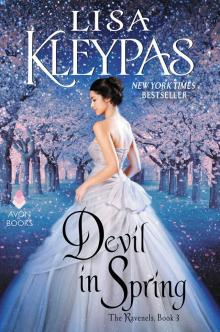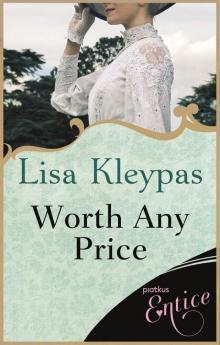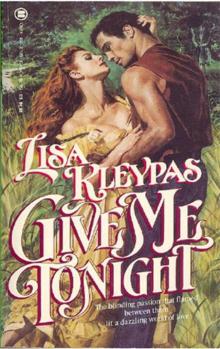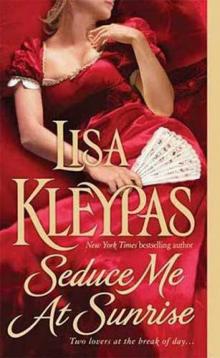- Home
- Lisa Kleypas
Devil in Spring Page 18
Devil in Spring Read online
Page 18
Gabriel was sitting at a heavy walnut desk, his profile edged in sunlight. He was reading a document with a slight frown of concentration, pausing to write on a scrap of notepaper. Dressed in a morning suit, with his hair neatly brushed and his face clean-shaven, he looked as fresh as a new-minted sovereign.
Although Pandora made no movement or sound, Gabriel’s gaze flickered to her. His slow smile made her lightheaded. “Come in,” he said, pushing back from the desk.
Feeling acutely self-conscious, Pandora approached him with flaming cheeks. “I was on my way to—well, I’m just wandering, but—I wanted to ask you about my slipper. Did you find it? Do you have it?”
He stood and looked down at her, his eyes like hot starlight, and for a moment all she could think of was the lick of firelight on shadowed skin. “I have the slipper,” he said.
“Oh, thank goodness. Because my lady’s maid is on the brink of reporting it to Scotland Yard.”
“That’s too bad. I’ve already decided to keep it.”
“No, you can only do that if it’s a dainty glass slipper. If it’s a big floppy slipper made out of fuzzy wool, you have to give it back.”
“I’ll consider it.” After glancing at the doorway to make certain they were unobserved, Gabriel bent to steal a swift kiss. “Will you talk with me for a few minutes? Or let me wander with you. There’s something important I want to discuss.”
Pandora’s stomach did a somersault. “You’re not going to propose, are you?”
His lips twitched. “Not right now.”
“Then yes, you can walk with me.”
“Outside? Through the gardens?”
She nodded.
As they exited from the side of the house and set out on a finely graveled walk, Gabriel seemed relaxed, his expression carefully neutral, but there was no hiding the faint pull of tension between his brows.
“What do you want to discuss?” Pandora asked.
“A letter I received this morning. It’s from Mr. Chester Litchfield, a solicitor in Brighton. He represented Phoebe in a dispute with her in-laws over some provisions in her late husband’s will. Litchfield is well versed in the property law, so I wrote to him immediately after I learned about your board game business. I asked him to find a way for you to legally maintain control over your company as a married woman.”
Surprised and uneasy, Pandora veered to the side of the path. She affected interest in a six-foot-tall shrub that bore massive white flowers the size of camellias. “What was Mr. Litchfield’s response?”
Gabriel approached her from behind. “He didn’t give the answers I wanted.”
Pandora’s shoulders drooped slightly, but she remained silent as he continued.
“As Litchfield put it,” Gabriel continued, “once a woman marries, she becomes more or less ‘civilly dead.’ She can’t legally enter into a contract with anyone, which means that even if she owns land, she can’t rent it out or build upon it. Even if property has been secured to her as a separate estate, her husband receives all the interest and profits. In the view of the government, a woman who tries to own anything separately from her husband is, in essence, stealing from him.”
“I already knew that.” Pandora wandered to the other side of the path to stare blindly at a bed of yellow primroses. What was the meaning of primroses? Chastity? No, that was orange blossoms . . . Was it constancy? . . .
Gabriel was still speaking. “Litchfield believes property law will continue to be reformed in the future. But as things stand now, the moment after the marriage vows are spoken, you’ll lose your legal independence and control of your business. However—” He paused. “Don’t start drifting. This next part is important.”
“I wasn’t drifting. I was only trying to remember what primroses mean. Would it be innocence, or is that for daisies? I think it’s for—”
“I can’t live without you.”
Pandora turned to face him sharply, her eyes wide.
“The meaning of primroses,” Gabriel said in a matter-of-fact tone.
“How do you know that?”
He looked wry. “My sisters often discuss drivel like flower symbolism. No matter how I try to ignore it, some of it seeps through. Now, back to Litchfield—he said that according to a recent amendment of the Married Women’s Property Act, if you earn a salary, you’ll be able to keep it.”
Pandora blinked and focused on him alertly. “Any amount of earnings?”
“As long as you’re seen to perform work that would justify it.”
“What does that mean?”
“In your case, you would have to take an active interest in the management of the company. You could also keep an annual bonus payment. I’ll ask Litchfield about sales commissions and a pension—you may be able to retain those as well. Here’s how we would structure it: Upon our marriage, when your business automatically transfers to me, I’ll put it in trust for you and hire you as the company president.”
“But . . . what about legal contracts? If I can’t sign anything, how could I enter into agreements with suppliers and stores, and how could I hire people—”
“We could hire a manager to assist you, on condition that he always comply with your wishes.”
“What about the company’s profits? They would go to you, wouldn’t they?”
“Not if you folded them back into the business.”
Pandora stared at him fixedly, her mind working over the idea, trying to comprehend what such a future would look and feel like.
The arrangement would give her more independence and authority than the law had ever intended a married woman to have. But she still wouldn’t be able to employ or fire anyone, or sign checks, or make decisions on her own. She would have to ask a male manager to sign contracts and agree to business deals on her behalf, as if she were a toddler. It would be difficult to negotiate for goods and services, because everyone would know that the ultimate authority lay not with her, but her husband.
It wouldn’t be ownership, but it would have the appearance of it. Rather like wearing a tiara and asking everyone to pretend she was royalty, when they all knew it was a sham.
Tearing her gaze from him, Pandora quivered with frustration. “Why can’t I own my business the way a man would, so no one could take it away from me?”
“I won’t let anyone take it from you.”
“That’s not the same. It’s all convoluted. It’s compromised.”
“It’s not perfect,” Gabriel agreed quietly.
Pandora paced in a small, tight circle. “Do you want to know why I love board games? The rules make sense, and they’re the same for everyone. The players are equal.”
“Life isn’t like that.”
“It certainly isn’t for women,” she said acidly.
“Pandora . . . we’ll set our own rules. I’ll never treat you as anything less than my equal.”
“I believe you. But to the rest of the world, I would be legally nonexistent.”
Gabriel reached out and caught lightly at her upper arm, interrupting her pacing. There was a ragged edge to his calmness now, like a hem that was coming unstitched. “You’ll be able to do the work you love. You’ll be a wealthy woman. You’ll be treated with respect and affection. You’ll—damn it, I’m not going to plead like a street beggar holding out his cap. There’s a way for you to have most of what you want—isn’t that enough?”
“What if our situations were reversed?” she shot back. “Would you give up all your legal rights and surrender everything you own to me? You’d never be able to touch a penny of your money, except by my leave. Think of it, Gabriel—the last contract you’d ever sign would be our marriage contract. Would marrying me be worth that?”
“That’s not a sane comparison,” he said with a scowl.
“Only because in one case, a woman gives up everything, and in the other, a man does.”
His eyes flashed dangerously. “Is there nothing to be gained, then? Does the prospect of living as my wife
have no appeal at all?” He took her in both hands, bringing her closer. “Say you don’t want me. Say you don’t want more of what we did last night.”
Pandora turned scarlet, her pulse running riot. She wanted to sink against him right then, and tug his head to hers and let him kiss her into obliviousness. But some stubborn, rebellious part of her brain wouldn’t be subdued.
“Would I have to obey you?” she heard herself ask.
His lashes lowered, and one of his hands came to the back of her head. “Only in bed,” he growled softly. “Outside of that . . . no.”
She took an unsteady breath, aware of strange pangs and zings of heat all through her body. “Then you’ll promise never to stop me from making my own decisions, even if you think it’s a mistake? And if you decide someday that my work isn’t good for me, that it poses a risk to my health or wellbeing or even my safety, you’ll guarantee that you’d never forbid me from doing it?”
Gabriel let go of her abruptly. “Damn it, Pandora, I can’t promise not to protect you.”
“Protecting can turn into controlling.”
“No one has absolute freedom. Not even me.”
“But you have so much of it. When someone has only a little of something, they have to fight to keep from losing any of it.” Realizing she was on the verge of crying, Pandora lowered her head. “You want to argue, and I know if we did, you’d score points and make it seem as if I were being unreasonable. But we could never be happy together. Some problems can never be solved. Some things about me can never be fixed. Marrying me would be just as impossible a compromise for you as it would be for me.”
“Pandora—”
She strode away without listening, nearly breaking into a run.
As soon as Pandora reached her room, she went back to bed, fully dressed, and lay unmoving for hours.
She felt nothing, which should have been a relief. But somehow it was even worse than feeling awful.
Thinking about things that usually made her happy had no effect. It didn’t help to envision her future of independence and freedom, and what it would look like to see stacks of her board games displayed on store tables. There was nothing to look forward to. Nothing would ever give her pleasure again.
Maybe she needed some kind of medicine—she was so terribly cold—could she have a fever?
Kathleen and the others had probably returned from their outing by now. But Pandora couldn’t turn to anyone for comfort. Not even her own twin. Cassandra would try to offer solutions or say something loving and encouraging, and Pandora would end up having to pretend to feel better to keep from worrying her.
Her chest and throat wouldn’t stop hurting. Maybe if she let herself cry, it would make her feel better.
But the tears wouldn’t come. They stayed locked inside the frozen vault of her chest.
This had never happened before. She started to become seriously worried. How long would this go on? She felt like she was turning into a stone statue, starting from the inside out. She would end up on a marble pedestal with birds perched on her head—
Tap, tap, tap. The bedroom door opened slightly. “Milady?”
Ida’s voice.
The lady’s maid came into the dim room, holding a little round tray. “I brought you some tea.”
“Is it morning again?” Pandora asked, in a daze.
“No, it’s three in the afternoon.” Ida came to the bedside.
“I don’t want tea.”
“It’s from his lordship.”
“Lord St. Vincent?”
“He sent for me and asked me to fetch you, and when I said you were resting, he said, ‘Give her some tea, then. Pour it down her throat if necessary.’ Then he handed me a note for you.”
How annoying. How incredibly highhanded. A flicker of actual feeling seared through the numbness. Groggily Pandora struggled to sit up.
After giving her the cup of tea, Ida went to draw back the curtains. The glare of daylight made Pandora flinch.
The tea was hot, but it had no flavor. She forced herself to drink it, and rubbed her dry, burning eyes with her knuckles.
“Here, milady.” Ida gave her a small sealed envelope, and took the empty cup and saucer.
Pandora looked dully at the red wax seal on the envelope, stamped with an elaborate family crest. If Gabriel had written something nice to her, she didn’t want to read it. If he’d written something not nice, she didn’t want to read that either.
“By the holy poker,” Ida exclaimed, “just open it!”
Reluctantly Pandora complied. As she pulled a small folded note from the envelope, a tiny, fuzzy object fell out. Reflexively she yelped, thinking it was an insect. But at second glance, she realized it was a bit of fabric. Picking it up gingerly, she saw that it was one of the decorative felt leaves from her missing Berlin wool slipper. It had been carefully snipped off.
My lady,
Your slipper is being held for ransom. If you ever want to see it again, come alone to the formal drawing room. For every hour you delay, an additional embellishment will be removed.
—St. Vincent
Now Pandora was exasperated. Why was he doing this? Was he trying to draw her into another argument?
“What does it say?” Ida asked.
“I have to go downstairs for a hostage negotiation,” Pandora said shortly. “Would you help put me to rights?”
“Yes, milady.”
The lavender silk dress had been crushed and crumpled into a mass of wrinkles, which obliged Pandora to change into a fresh day gown of plain-woven yellow faille. This frock wasn’t as fine as the first one, but it was lighter and more comfortable, without so many underskirts. Fortunately her elaborate hairstyle had been so well anchored and pinned that it needed minimal repair.
“Will you take out the pearl pins?” Pandora asked. “They’re too nice for this dress.”
“But they look pretty,” Ida protested.
“I don’t want to look pretty.”
“What if his lordship proposes?”
“He won’t. I’ve already made it clear that if he did, I wouldn’t accept.”
Ida looked aghast. “You . . . but . . . why?”
It was over the line, of course, for a lady’s maid to ask such a thing, but Pandora answered nonetheless. “Because then I’d have to be someone’s wife instead of having my own board game company.”
A hairbrush dropped from Ida’s lax fingers. Her eyes were like saucers as she met Pandora’s gaze in the vanity mirror. “You’re refusing to marry the heir to the Duke of Kingston because you’d rather work?”
“I like work,” Pandora said curtly.
“Only because you don’t have to do it all the time!” A thunderous expression contorted Ida’s round face. “Of all the ninny-pated things I’ve heard you say, that is the worst thing ever. You’ve gone off your nob. To refuse a man such as that—what can you be thinking? A man almost too beautiful to live . . . a young, strapping man in the full vigor of his years, mind you . . . and on top of that, he’s rich as the Royal Mint. Only a donkey-headed halfwit would turn him away!”
“I’m not listening to you,” Pandora said.
“Of course you’re not, because I’m making sense!” Heaving a tremulous sigh, Ida bit her lip. “Blest me if I’ll ever understand you, milady.”
The outburst from her overbearing lady’s maid did little to improve Pandora’s mood. She went downstairs, feeling like she had a brick in her stomach. If only she’d never met Gabriel, she wouldn’t have to face this right now. If only she hadn’t agreed to help Dolly, and managed to trap herself in a settee. If only Dolly hadn’t lost her earring in the first place. If only she’d never gone to the ball. If only, if only . . .
As Pandora reached the formal drawing room, she heard piano music through the closed doors. Was it Gabriel? Did he play the piano? Perplexed, she opened one of the doors and went inside.
The drawing room was handsome and spacious, with intricate parquetry wood floors
, wainscoted walls painted a creamy shade of white, and abundant windows draped with soft folds of pale, semi-transparent silk. The carpets had been rolled back to the side of the room.
Gabriel stood at a mahogany grand piano in the corner, riffling through sheet music, while his sister Phoebe sat on a bench in front of the keyboard. “Try this one,” he said, handing her a piece of paper. He turned at the sound of the door closing, his gaze meeting with Pandora’s.
“What are you doing?” Pandora asked. She approached him in cautious steps, tense as a horse ready to bolt. “Why did you send for me? And why is Lady Clare here?”
“I asked Phoebe to help us,” Gabriel said pleasantly, “and she kindly agreed.”
“I was coerced,” Phoebe corrected.
Pandora shook her head in confusion. “Help us to do what?”
Gabriel came to her, his shoulders blocking them from his sister’s view. His voice lowered. “I want you to waltz with me.”
Pandora felt her face go bleach-white with hurt, then red with shame, then white again, like the alternating stripes on a barber’s pole. She would never have imagined him capable of such vicious mockery. “You know I can’t waltz,” she managed to say. “Why would you say something like that?”
“Just try it with me,” he coaxed. “I’ve been thinking about it, and I believe there are ways I can make waltzing easier for you.”
“No, there aren’t,” Pandora retorted in a scalding whisper. “Did you tell your sister about my problem?”
“Only that you have difficulty dancing. I didn’t tell her why.”
“Oh, thank you, now she thinks I’m clumsy.”
“We’re in a large, basically empty room,” Phoebe said from the piano. “There’s no point in whispering, I can hear everything.”
Pandora turned to flee, but Gabriel moved to block her.
“You’re going to try this with me,” he told her.
“What is the matter with you?” Pandora demanded. “If you deliberately tried to come up with the most unpleasant, embarrassing, frustrating activity for me to attempt in my currently unstable emotional condition, it would be waltzing.” Fuming, she looked at Phoebe and spread her palms upward, as if to ask what could be done with such an impossible human being.

 Devil in Spring
Devil in Spring Sugar Daddy
Sugar Daddy Devil in Winter
Devil in Winter Dreaming of You
Dreaming of You Christmas Eve at Friday Harbor
Christmas Eve at Friday Harbor Love, Come to Me
Love, Come to Me Only With Your Love
Only With Your Love Suddenly You
Suddenly You Secrets of a Summer Night
Secrets of a Summer Night Cold-Hearted Rake
Cold-Hearted Rake Where's My Hero?
Where's My Hero? Gifts of Love
Gifts of Love Married by Morning
Married by Morning Then Came You
Then Came You Wish List
Wish List Where Dreams Begin
Where Dreams Begin A Historical Christmas Present
A Historical Christmas Present Somewhere I'll Find You
Somewhere I'll Find You Scandal in Spring
Scandal in Spring Someone to Watch Over Me
Someone to Watch Over Me Worth Any Price
Worth Any Price Prince of Dreams
Prince of Dreams It Happened One Autumn
It Happened One Autumn Love in the Afternoon
Love in the Afternoon Devil's Daughter
Devil's Daughter A Wallflower Christmas
A Wallflower Christmas Tempt Me at Twilight
Tempt Me at Twilight Brown-Eyed Girl
Brown-Eyed Girl Mine Till Midnight
Mine Till Midnight Again the Magic
Again the Magic Lady Sophia's Lover
Lady Sophia's Lover Because You're Mine
Because You're Mine Midnight Angel
Midnight Angel Smooth-Talking Stranger
Smooth-Talking Stranger Blue-Eyed Devil
Blue-Eyed Devil Hello Stranger
Hello Stranger Dream Lake
Dream Lake Devil's Daughter: The Ravenels Meet the Wallflowers
Devil's Daughter: The Ravenels Meet the Wallflowers A Christmas to Remember
A Christmas to Remember Smooth Talking Stranger
Smooth Talking Stranger Crystal Cove
Crystal Cove Marrying Winterborne
Marrying Winterborne Stranger in My Arms
Stranger in My Arms Devil in Disguise
Devil in Disguise Worth Any Price bsr-3
Worth Any Price bsr-3 Give Me Tonight
Give Me Tonight Rainshadow Road fh-2
Rainshadow Road fh-2 Seduce Me At Sunrise
Seduce Me At Sunrise I Will
I Will Someone to Watch Over Me bsr-1
Someone to Watch Over Me bsr-1 Lady Sophias Lover bsr-2
Lady Sophias Lover bsr-2 A Hathaway Wedding
A Hathaway Wedding A Hathaway Wedding (Hathaways Bk2.5)
A Hathaway Wedding (Hathaways Bk2.5) Worth Any Price - Bow Street 3
Worth Any Price - Bow Street 3 Christmas with Holly
Christmas with Holly